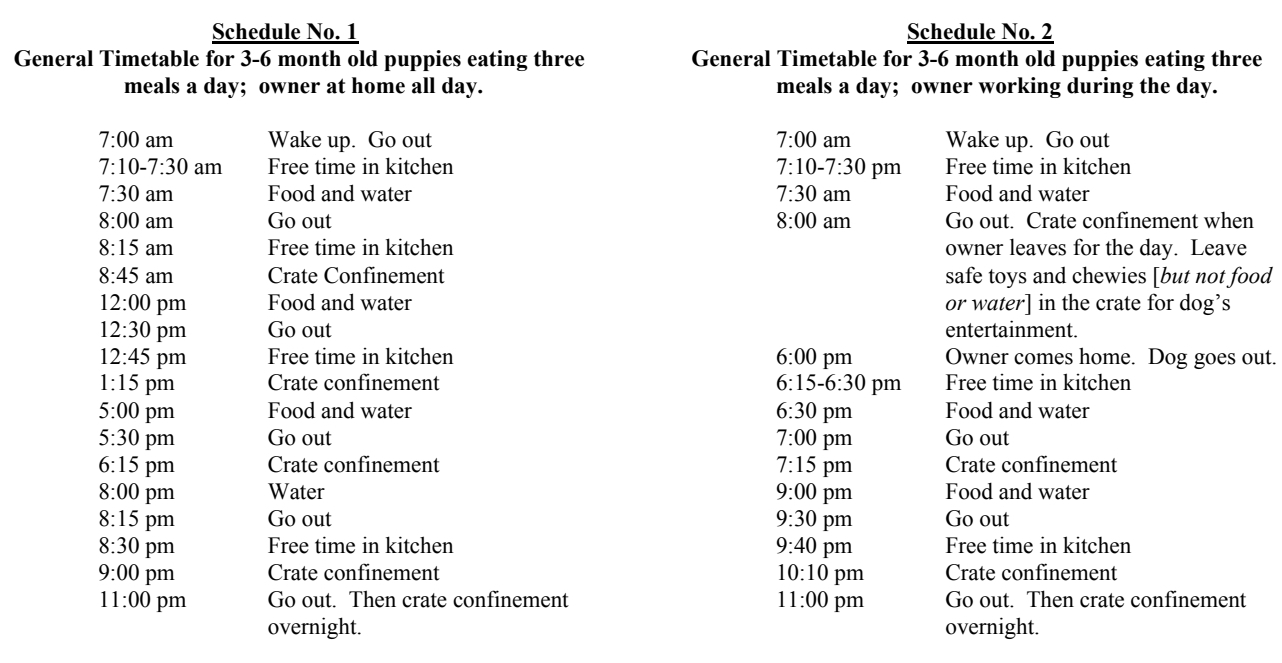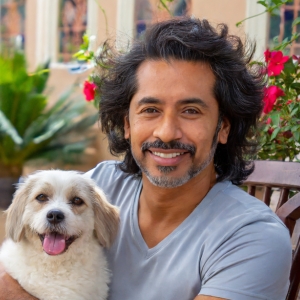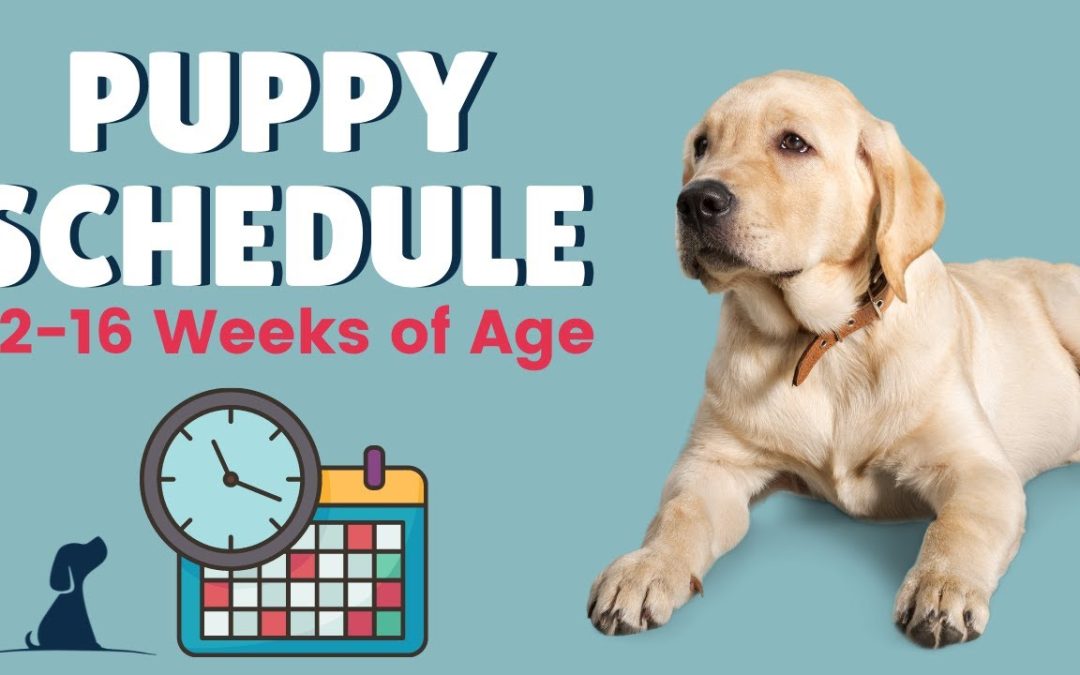To crate train a 12-week-old puppy, create a consistent schedule for feeding, potty breaks, and playtime to establish a routine and teach them to associate the crate with positive experiences. Introduce the crate gradually, starting with short periods and gradually increasing the time as the puppy becomes more comfortable.
Consistency and patience are key to successful crate training at this age. Crate training is an essential part of raising a well-behaved and well-adjusted puppy. At 12 weeks, puppies are still young and impressionable, so it’s the perfect time to start crate training.
By following a proper schedule and introducing the crate in a positive manner, you can help your puppy develop good habits and reduce anxiety around being created. We will outline a crate training schedule for a 12-week-old puppy, along with some tips to make the process easier and more effective.

Credit: www.thepuppyacademy.com
Benefits Of Crate Training
Crate training for puppies at 12 weeks offers numerous benefits, including creating a safe and secure space for the puppy, aiding in potty training, and providing structure to their daily routine. By following a consistent schedule, puppies can adapt to the crate and feel comfortable in it, leading to a positive overall experience.
| Crate training for puppies provides a safe environment and a sense of security. |
| It helps them learn boundaries and establish independence at an early age. |
| Puppies who are crate-trained are less likely to get into dangerous situations. |
| This method encourages them to develop good behaviors and habits. |
Setting Up The Crate
Crate size is crucial, ensure it’s not too big. Buy a small cozy bed for comfort, and don’t forget to add some toys. Place the crate in a quiet area, allowing the puppy to relax. Cover the crate with a light blanket for a cozy den feeling. Gradually introduce the puppy to the crate, and always use positive reinforcement.
Introduction To The Crate
Crate training is an essential part of raising a well-behaved and happy puppy. It provides them with a safe and secure space where they can retreat and rest. When introducing your puppy to the crate, make use of positive association techniques. Place their food and treats inside the crate to create a positive connection. Start by leaving the crate door open and allow your puppy to explore it at their own pace. Encourage them to enter the crate and praise them when they do. Gradually increase the time spent inside the crate.
Remember to provide comfortable bedding and interesting toys to keep them occupied. Make sure the crate is large enough for your puppy to stand, turn around, and lie down comfortably. With patience and consistency, your puppy will learn to associate the crate with a positive experience.

Credit: www.dreamydoodles.com
Establishing A Routine
One key aspect of puppy crate training is establishing a routine that includes scheduled potty breaks and meal times in the crate. By following a consistent schedule, you can help your puppy learn bladder control and develop good eating habits. Scheduled potty breaks are crucial to prevent accidents in the house. Use a timer or set specific intervals to take your puppy outside for bathroom breaks.
Meal times in the crate also help create a positive association with the crate and establish it as a safe and comfortable space for your puppy. Feed your puppy in the crate, placing the food bowl towards the back. This encourages your puppy to enter the crate willingly and prevents them from bolting out before finishing their meals.
Daytime Crate Training
Embarking on a puppy crate training schedule at 12 weeks can enhance daytime crate training. Consistent routine aids in potty training and reduces separation anxiety, ensuring a well-adjusted pup. Gradually increase crate time with positive reinforcement for optimal results.
Gradual Intervals Inside Crate
| Playtime and Rest |
|---|
| Start by introducing your puppy to the crate for short periods, gradually increasing the duration as they become more comfortable. |
| During playtime, engage with your puppy using interactive toys and games that keep them mentally stimulated and physically active. |
| Ensure that your puppy has enough rest between play sessions to prevent overexertion and exhaustion. |
| Divide your puppy’s playtime and rest periods throughout the day to maintain their energy levels and focus. |
| Remember to provide positive reinforcement and rewards whenever your puppy behaves well during crate training. |
Nighttime Crate Training
When considering your puppy’s crate training schedule at 12 weeks, focus on nighttime routines. For nighttime crate training, ensure a pre-bedtime potty break is part of your routine. Establish a silent nighttime routine to promote calmness and rest for your furry friend.
Consistency Is Key
| Consistent routine builds trust in puppies. Repeat cues and commands daily. Monitor the puppy’s behavior closely. Adjust training schedule as needed. |

Credit: www.pinterest.com
Troubleshooting Common Issues
When your puppy starts whining and barking inside the crate, it might be due to feeling anxious or lonely. To address this, try placing the crate in a quiet, cozy area and leaving a comforting toy or blanket inside. Providing crate training during meal times can also help create positive associations with the crate.
If your puppy is having accidents inside the crate, it’s essential to assess the crate size and ensure it’s not too large. Dogs naturally avoid soiling their living area, so a crate that’s just big enough for them to stand, turn around, and lie down will discourage accidents. Implementing a regular potty schedule will also minimize accidents.
Frequently Asked Questions
How Much Time Should A 12-Week Old Puppy Crate?
A 12-week-old puppy can stay in a crate for 2-4 hours at a time. It’s important to gradually increase crate time.
Is 12 Weeks Too Late To Crate Train A Puppy?
No, 12 weeks isn’t too late to crate-train a puppy. It’s a good age to start. Puppies can still learn and adapt well to crate training at this stage. Just be patient and consistent in the training process.
What Is A Good Schedule For A 12-Week-Old Puppy?
A good schedule for a 12-week-old puppy includes regular feeding, potty breaks every 2-3 hours, playtime, and training sessions. Ensure plenty of rest and socialization for healthy development.
What Commands Should A Puppy Know At 12 Weeks?
A puppy should know basic commands like sit, stay, come, and leave it by 12 weeks old. Start training early for better behavior and obedience.
Conclusion
Crate training is a vital tool for your 12-week-old puppy’s development. Consistency, patience, and positive reinforcement are essential for successful crate training. The schedule outlined in this blog will help you create a structured routine for your puppy, leading to a happy and well-adjusted pet.
Start crate training with confidence and enjoy the benefits of a well-behaved companion.

Hello, I’m Ethan Mitchell. My passion is dog training and behavior enthusiasts. With years of experience working with various breeds, my goal at Dog Advisor Pro is to help dog owners build strong, loving relationships with their furry friends through effective training techniques. Understanding a dog’s behavior is the key to harmonious companionship. I am dedicated to sharing practical training tips that improve the lives of dogs and their owners.


